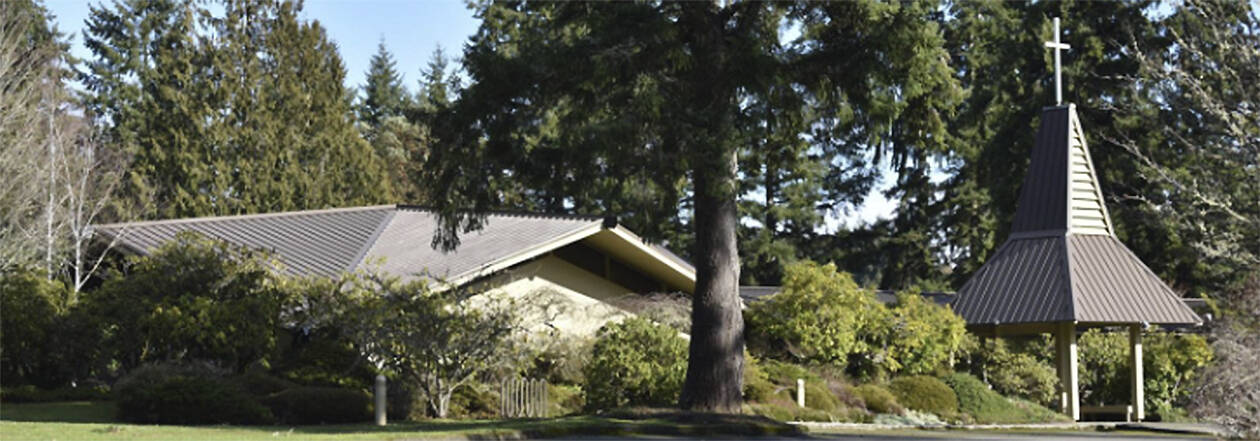Responding to criticism that Bainbridge Island was creating an ordinance specific to Bethany Lutheran Church, the BI Planning Commission has started work to make it more all-encompassing.
One of the changes would be to limit the size of affordable houses.
BI is working on an ordinance in response to a state law allowing cities to give increased density to religious organizations trying to increase affordable housing. Low income means $75,300 gross for a family of four.
Sarah Blossom, commission chair, suggested limiting the size of the housing to 1,250 square feet for a family of four; 1,150 for three; 775 for two; and 600 for a studio. She came up with those numbers by talking to architects.
Bethany’s request had asked for up to 24 houses to be as large as 1,600 square feet.
Commissioner Bill Chester added that in 1959 the average size of a three-bedroom home was 960 square feet. “Limit on size is not a bad thing.” He said he used to live in a 1,200-square-foot home with a family of four and was comfortable. Smaller homes help keep them affordable. “Every square foot costs huge money. Just because it’s small doesn’t mean it can’t be elegant.”
Commissioner Lisa Macchio said, “I hate to start dictating the size of homes,” adding their job is to make sure developments are consistent with the Comprehensive Plan in areas such as open and community space.
Blossom said smaller houses have less of a footprint, are more energy-efficient, have fewer impervious surfaces and help achieve BI goals of sustainability.
Macchio said Bethany not having an exact development plan is a cause of tension for her. She worries that smaller housing is inequitable for low-incoming people. She doesn’t want to lower the quality of affordable housing.
Commissioner Ashley Mathews said since the project is unknown that justifies parameters, while fellow Commissioner Yesh Subramanian said such limits “make sense to me.”
If the numbers end up not working they would be “easy to amend,” Blossom concluded.
She also recommended that parking for affordable housing be determined by parking studies for each project. The goal is to minimize pavement and “get people out of their cars. Instead of blanket parking (code) the study decides.”
Macchio recommended a transportation-mobility study instead. That would look at a number of issues, not just parking. For example, the developer might be required to provide a fleece of electric bikes for residents.
Chester and Subramanian liked that idea.
“We should do all projects that way,” he said.
Chester said that study would look at connectivity and consider where people have to go. “It’s not just e-bikes. It’s every type of transportation.”
Two other ideas were tabled, and density, the big question, wasn’t discussed due to lack of time.
Macchio said, regarding community space, “This is a tough one for me.” She doesn’t like the idea of saying a project must have 25% because it’s too arbitrary. It depends on the number of homes and number of people.
Macchio said Bethany is being given “an amazing amount of density,” but she wants to know what BI is getting in return. “We basically are creating a new animal here. We need to think outside the box as much as we can.”
Subramian said because the gap among commissioners was large they should come back to it. Macchio suggested looking for great examples of community space before it’s discussed again.
Macchio brought up an idea that also was tabled. She said she wanted code to say projects would remain affordable in perpetuity.
Mathews suggested that policy would not be equitable. When other people sell their homes they can make a large profit.
A public hearing was set for March 10.
Public comment
About a dozen people commented.
Maggie Rich of Housing Resources Bainbridge has a waiting list of 90 who need affordable rentals and 30 looking for 3-4 bedroom homes. “There’s an urgent need,” she said. “They are certain to fill up very quickly. “Let’s make the most of it.”
Melanie Keenan suggested the city should wait on any upzoning until the groundwater management plan is done because BI’s sole source aquifer limits its water supply.
Jim Halbrook asked what the city has against the Finch Road neighborhood. He said a few years ago “McMansions” were built that “damaged this community.”
Bob Russell said Bethany should have no more than 20 units to keep them affordable as construction costs are high and interest rates will be going up.
Kent Scott suggested “no more development than what’s allowed now.” He asked them to protect the rural character and quality of life of the neighborhood.
Joseph McMillan appealed to the commission “not to permit destruction of that beautiful, natural habitat.” He said it’s a false choice that it has to be either/or. “We need both, and I think we can have both,” he said, adding there are other places for affordable housing.
Jason Wilkinson said equitable outcomes will depend on the process. “Favoritism can taint future projects” if the code only applies to Bethany, he said. Wilkinson added that developers should “tap into creativity of the community” for things like having buildings capture groundwater so the project doesn’t degrade the aquifer.
The pastor of Bethany Lutheran Church, Paul Stumme-Diers, said they love the community and want to find a balance so they can come together. “We want to pursue it in a responsible way and get it done.” But he also had a few questions. “If not now then when? If not Bethany then where? If not Bethany, who will do it?”



